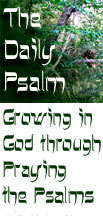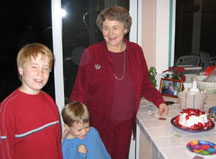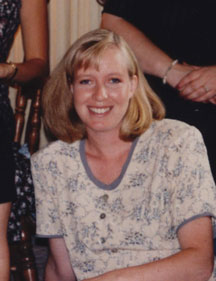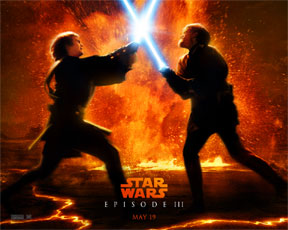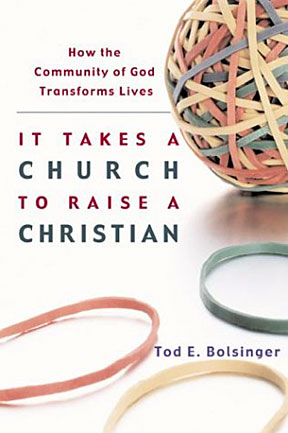| |
A Resource by Mark D. Roberts |
|
Archive for May 2005
Note: This archive contains all of my posts for this month that are not included in some other series. I really don't have the time to save things in more than one place. If you're looking for a specific item, use the "Search" button in the upper left hand corner. Thanks. |
by Rev. Dr. Mark D. Roberts
Copyright © 2005 by Mark D. Roberts
Note: You may download this resource at no cost, for personal use or for use in a Christian ministry, as long as you are not publishing it for sale. All I ask is that you give credit where credit is due. For all other uses, please contact me at mark@markdroberts.com. Thank you.
How Not to Make Conflict Worse: Wisdom from My Mother 
Posted for Mother's Day, Sunday, May 8, 2005
First of all, I want to wish a Happy Mother's Day to all of my readers who are also moms.
Today's post isn't a part of my current series, strictly speaking, though it is closely related. In this post I want to honor my mother by remembering some of the best advice she ever gave me. If you follow her advice, I guarantee, not only that you'll have less conflict in your life, but also that you'll be well on your way to bringing peace both in the church and in the world.
What's this gem of advice? It's simple: Two wrongs don't make a right. I don't know the origins of this saying. I've searched around a bit and haven't found much help. (Any ideas?) But, in point of fact, in my own life the origin is clear. "Two wrongs don't make a right" came out of the mouth of my own mother, probably a thousand times.
I grew up in a family with four children. Inevitably we would bug each other, borrow each other's stuff without asking, or even hit one another in anger. What would my mom say as one of us was running off to seek revenge? "Two wrongs don't make a right."
I don't know if, when I was young, my mom's logic ever persuaded me not to multiply wrongs. But I did know that if I clobbered my brother after he hit me, there would be consequences I didn't want to face. "Two wrongs don't make a right" in the Roberts's Boyhood Translation meant: "You do it, and you're in big trouble." |
|
| |
My mom and a couple of her silly grandchildren getting ready to celebrate her birthday. |
As an adult I've come to appreciate the wisdom of my mom's simple proverb. From personal experience, I know that if somebody hurts me and I strike back in anger, things will only get worse. I must confess that I've probably done this a hundred times in the last ten years. One of my favorites happened in a meeting of the board of elders of my church. An elder made a suggestion that I found personally offensive (though he didn't mean it that way). Without even thinking I shot back, "Over my dead body will that happen!" Now, of course, it was his turn to be offended. But this man, obviously having internalized my mother's advice better than I had, responded by apologizing for having offended me. I quickly backed down, feeling rather like a fool.
As I watch Christians going through conflict, both in my church and in others, I'm amazed at how often godly, mature people respond to wrongdoing in another by doing wrong themselves. Sometimes this happens in a flash of anger, which is understandable though unacceptable. But sometimes people choose quite intentionally to do wrong to those who have wronged them. It always amazes me, but it's true.
For example, a couple of years ago leaders in one of my ministries were struggling with disagreement over a strategic plan. One man I'll call "Jim" said something that seemed to impugn the integrity of another man I'll call "Andy." Andy, incensed and embarrassed, sent Jim a scorching e-mail, copying me and several others in the process. Andy's note was so obviously inconsistent with Christian kindness that I was shocked, not only that he would act this way, but also that he would actually send a copy of his literary sin to me and several others. But Andy didn't see his behavior this way. He viewed his harshness as necessary and consistent with the way Jim had treated him. It was consistent with Jim's initial offense, but that was exactly the problem. Rather than speaking the truth in love, Andy had chosen to fight fire with fire, or more literally, to fight sin with sin. Not a good idea. Just ask my mother. (Of course if you don't believe her, you could ask Jesus, who told us to do things like turn the other cheek and walk the second mile.)
All of this is easy to say when you're sitting on the sidelines. But when you're in the heat of conflict, it's terribly easy to give in to the fallen desire for revenge. Rather than taking the high road, we get down in the gutter with the one who has wronged us. Then when everything is worse, when we're all muddy and dirty, we wonder what went wrong. Again, I speak from personal experience.
So if when you find yourself in conflict with another person, and especially if that person takes a shot at you, I'd urge you to remember my mother's wisdom: "Two wrongs don't make a right." Even though you've been wronged, choose to do what is right in the eyes of the Lord. You'll be glad you did, and so will He.
A Bittersweet Day 
Posted for Sunday, May 15, 2005
If you've been reading my blog for a while, you may remember a post I put up just over a year ago, on May 1, 2004, to be exact. It was called "A Sad Day." In this post I described the death of my family's puppy Mandy, and how hard it was for my children. I also shared the story of a dear friend named Julie, a mother with two young children who was struggling with cancer.
I'm sad to report that Julie died last week, leaving behind a devoted husband and two wonderful children, aged 7 and 3, not to mention her loving parents and tons of grieving friends. Though Julie fought her cancer with every bit of strength she could muster, it finally won the battle for her body.
This afternoon I'll be going to Julie's memorial service. That's why it's a bittersweet day.
This is a sweet day because I'll spend a good part of it remembering Julie, who was one of the sweetest people I've ever known. And, believe me, I'm not simply exaggerating in the way people sometimes do when somebody dies. If you'd asked me seven years ago, before Julie was diagnosed with cancer, to name the kindest people I knew, I'm quite sure Julie would have been high on the list. I've known her for over thirty years, since she was a child. She was very active in my ministry when I was the College Director at the First Presbyterian Church of Hollywood. Over the years I probably spent 200 hours with Julie in one setting or another, and my wife could probably double that number. In all of that time Julie was never cross with me. She always inquired about my well being, which wasn't common among my college students by the way. Julie prayed for me regularly and was always faithful with birthday cards and other encouraging gestures. Remembering Julie is sweet because that's what Julie was . . . in abundance. |
|
| |
This picture captures the sparkle in Julie's soul.
|
This is a bitter day because Julie is no longer with us. Yes, I will miss her, as will my wife and children. But most of all I ache for her dear family. I can only imagine the agony of her husband, not to mention her parents. I know from pastoral experience that burying one's child is one of life's deepest hurts. Yet, beyond this, I weep for Julie's children. I wonder how her three-year-old daughter will make sense of the fact that her mommy can't come home. And I can hardly imagine the loneliness that her seven-year-old son will feel. The loss for these two children ins monumental in every way, and I find myself praying for them many times each day.
This is a bitter day because I feel so profoundly the brokenness of our world. In Romans 8 the Apostle Paul speaks of creation as being "subjected to futility" and in "bondage to decay" and "groaning in labor pains" (8:19-22). Today I can feel the futility, decay, and groaning in my bones. The world isn't right when such a delightful, brilliant, faithful, loving daughter, wife, and mother dies of cancer. Someone asked me this week why God allows such terrible things as this. I can offer a theologically-satisfying answer, pointing to the impact of sin and so forth. But this is not a emotionally-satisfying answer when I'm witnessing the suffering of people I love.
This is a sweet day because we'll celebrate, not only Julie's life, but also her eternal life. Julie believed in Jesus with all her heart, and I have no doubt about her eternal destiny. She's with Jesus in Paradise today. She knows wholeness and joy in a way we can barely imagine. This doesn't take away the pain of losing Julie, and it doesn't minimize the suffering of her dear family, but it does add a genuine reason for rejoicing.
So this is, for me and so many others, a bittersweet day. It's a day filled with sorrow and joy, with sadness and celebration.
When I officiate at memorial services, I sometimes read a portion of Ecclesiastes 3. It's a familiar text, largely because of the song "Turn, Turn, Turn" written by Pete Seeger. This song is based on Ecclesiastes 3, and was recorded by the Byrds in the mid-1960s:
For everything there is a season, and a time for every matter under heaven:
a time to be born, and a time to die;
a time to plant, and a time to pluck up what is planted;
a time to kill, and a time to heal;
a time to break down, and a time to build up;
a time to weep, and a time to laugh;
a time to mourn, and a time to dance;
a time to throw away stones, and a time to gather stones together;
a time to embrace, and a time to refrain from embracing;
a time to seek, and a time to lose;
a time to keep, and a time to throw away;
a time to tear, and a time to sew;
a time to keep silence, and a time to speak;
a time to love, and a time to hate;
a time for war, and a time for peace.
Perhaps more than any other life setting, memorial services provide a place to experience in a single moment the diverse range of this text. Here we remember birth as we gather on the occasion of death. Here wounds are felt and also healed. Here we weep freely, and in the next moment laugh as we enjoy a silly memory. At a memorial service we mourn. Yet I have watched young children, just as soon as grandpa's body is in the ground, begin dancing around as if nothing sad had just happened. At memorial services there's always lots of embracing, though sometimes we sense that people need to be left alone. There is silence and there is speaking. I've even seen hate in a memorial service, as parents rage against violence that stole the life of their child. But mostly there is love, lots and lots of love.
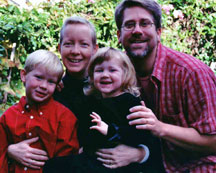 |
As a pastor I go to more memorial services than most people. You might be tempted to think of this as a downside of my calling. But I see it differently. In memorial services I'm reminded of how fragile life is, and also how precious. I'm encouraged too look afresh at my own life and to remember that I don't have forever in this world. I'm able to renew my commitment to living for what truly matters as I try not to get caught up in the trivia that so easily dominates my existence.
What will I take away from Julie's memorial service? It's hard to say for sure, but I expect that I will be encouraged by her example to be more kind and generous. I will treasure this life in all of its ambiguity. And I will embrace my wife and children with deeper gratitude, remembering at least for a moment not to take them for granted. Most of all, I will give thanks to God that death is not the end, but just the beginning. |
Julie and her family at the end of 2004.
|
|
If you are a person who prays, would you offer a short prayer for Julie's family, that they might know God's presence and peace even in their suffering.
Star Wars, Episode III 
Posted for Friday, May 20, 20005
I saw the latest Star Wars film tonight. If you haven't seen it yet, don't worry, nothing in this column will spoil the movie's surprises.
I enjoyed the film quite a bit. The special effects are astounding. George Lucas has managed to create, not a magical world, but many of them. The creatures and machines that fill these worlds are equally amazing. My only fear is that if, in the future, people watch the six Star Wars films in narrative sequence, the visual shift from Episode III to Episode IV (now 28 years old) will be like moving your eyes from the Mona Lisa painting to a cartoon drawing of Lisa Simpson.
Many critics have pointed out the weakness in the dialogue of Episode III. There were only a few times when the lines were so bad as to make me realize it. Sadly, some of these scenes had the greatest potential to draw me emotionally into the film. But their woodenness limited my emotional engagement to some extent.
Nevertheless, I was engaged by the story, most of all the story of how an overly ambitious but basically good Anakin Skywalker becomes the truly evil Darth Vader. I knew Lucas had to throw in some creative plot twists here, and this he did, to my satisfaction. (I won't supply details because I don't want to ruin the surprise.) |
|
Everybody says this is a dark film, the darkest of the Star Wars films by far. There's no question about this. It's also the most graphically disturbing film of the sequence, deserving of its PG-13 rating.
| Warning to parents: Episode III does indeed include several very intense scenes that are not appropriate for younger children. This is too bad, in a way, because it means that children under ten, maybe under twelve, shouldn't see the whole Star Wars sequence. But it wouldn't have made much sense for this movie to be lighthearted. It could have been a bit less grisly, however, if getting a PG rating had been a high priority. |
Although the film foreshadows what is to come, and thus we get a tiny taste of "the new hope" of Episode IV, I left the film feeling rather melancholy. The transformation of Anakin Skywalker is sad, as is the impact of his change on many characters. I'm certainly glad we don't have to wait years for the next chapter in the story to come out.
In my next post I want to philosophize a bit about what Star Wars teaches us concerning the power of "the dark side." I think there's a good lesson here, perhaps several.
Congratulations to Tod Bolsinger! 
Posted for Saturday, May 28, 2005
Congratulations are in order for Tod Bolsinger, senior pastor of San Clemente Presbyterian Church, blogger, and author of two outstanding books. Why? Because Tod's first book, It Takes a Church to Raise a Christian, received an Award of Merit in the 2005 Christianity Today book awards. This means, basically, that his book was runner-up in the Church/Pastoral Leadership category
This is a huge honor for Tod, and well-deserved, I might add. I have been recommending It Takes a Church since it was first released. In fact, here is my brief review at Amazon.com:
There are many books on the church. Some of them have theological substance, but they're hopelessly hard to read -- for experts only. Others are readable, but so "lite" and "practical" that you wonder if the author has done much theological or biblical reflection on the subject matter.
Once in a great while a book comes along that combines genuine theological substance with engaging readability. This is the book!
Bolsinger has done his theological homework. (This book is a popularized version of his Ph.D. dissertation.) He will help you to see the church in relationship to the Trinity. But he is also an engaging writer, whose turns of phrase are memorable and whose illustrations are insightful.
If you're looking for a "seven superficial secrets to make your church grow" kind of book, look elsewhere. But if you're seeking a biblically-based, theologically-solid book that is also readable and engaging, then buy this book. Right now would be a good idea!
|
|
So if you haven't bought this book, why not do so right now? Now you don't have to take my word for it. You've got the weight of a Christianity Today Aware of Merit backing up my recommendation.
You might wonder which book in the Church/Pastoral Leadership took first prize. The answer is ironic, in that the winning book was co-written by Robert Banks, the advisor for Tod's Ph.D. dissertation at Fuller, which was the basis for It Takes a Church. I haven't yet read the wining book, Reviewing Leadership: A Christian Evaluation of Current Approaches. But I have the highest regard for Robert Banks and his co-author, Bernice Ledbetter. So it doesn't surprise me that their book took top honors in the Church/Pastoral Leadership category.
Memorial Day Gratitude 
Posted for Memorial Day, Monday, May 30, 2005
When I was young, Memorial Day was wonderful because it signified the beginning of summer. Even though I always had a few more days of school after the holiday, nevertheless, Memorial Day meant that summer was upon us.
Now that I'm not so young, Memorial Day still signifies the beginning of summer. My pastoral work year tends to align itself with the school calendar, so Memorial Day means that I'm about ready to enjoy a break from work. Though I love being a pastor, I find myself overdue for some time of renewal and refreshment.
But Memorial Day means more to me now than it once did because I think about its deeper meaning. Why? It first happened in 1991, in the aftermath of Desert Storm (the first Gulf War). I did not know anyone who was killed in that war, but my brother-in-law did see active duty in Bahrain as a member of an Air Force military unit. Though he was mostly far away from direct combat, he was on the ground in Bahrain when Iraq fired some Scud missiles in his general direction. Of course now we know that the Scuds weren't all that worrisome. But at the time we feared that they might contain biological or chemical materials. So there were some tense moments in 1991 as I wondered if my brother-in-law would survive.
Before that time, I confess that I'd never really thought about the fact that men and women were putting their lives on the line for the sake of my freedom. And, honestly, I didn't feel all that grateful for those who had actually sacrificed their lives in defense of my liberty. But, with my brother-in-law in the line of fire, my appreciation for the courage and sacrifice of people in the armed forces grew a hundred fold. I began to realize how much it cost for me to be free, and I became truly thankful for those who paid the price for my freedom.
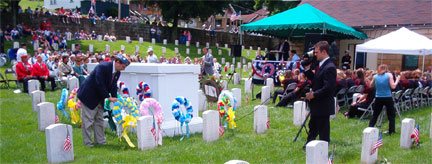 |
A memorial day celebration in Grafton, West Virginia. |
Yes, I'm well aware that these people didn't die for me personally. No doubt they died for our country in the broad sense, and specifically for their own families and friends. But I am a beneficiary of their sacrifice. It impacts me personally. And for this I find myself more and more grateful each year.
So on this Memorial Day, as I gather with friends for a swim party, I will remember those who sacrifice has made this possible. I will be grateful for the freedom to get together with any friends I chose, for the freedom from worry about being attacked, and for the economic blessings that result from our freedom, blessings that allow me to sit around a wonderful pool with my friends. I will say a prayer of thanks for those who have given their lives to gain and protect my freedom. I will pray for surviving families for whom Memorial Day must be filled with both grief and pride. And I will pray for those who continue to put their lives on the line for my sake and the sake of our nation.
Thanksgiving is still 179 days away. But today I am very thankful.
Home
|


